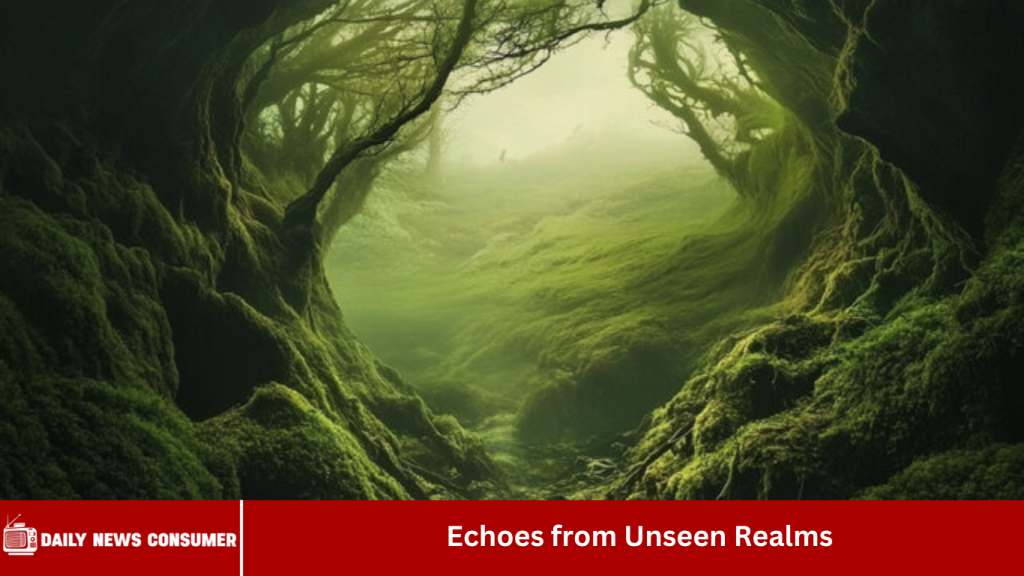Hi everyone! How are you all doing? Welcome to www.dailynewsconsumer.com! Throughout human history, the allure of the unseen has captivated our imagination. From ancient myths to modern scientific inquiries, the idea that there exist realms beyond our sensory perception has persisted. These “unseen realms” are often thought to be the source of mysterious echoes—subtle hints or manifestations that suggest a reality beyond our own. This article delves into the concept of these unseen realms, examining their presence in various cultural, spiritual, and scientific contexts.
The Concept of Unseen Realms
Unseen realms refer to dimensions or aspects of reality that are not directly observable through our five senses. They encompass a wide range of ideas, from spiritual and metaphysical planes to theoretical constructs in physics. The echoes from these realms are the subtle signs—be they experiences, phenomena, or intuitions—that hint at their existence.
Spiritual and Religious Perspectives
Eastern Philosophies
In many Eastern traditions, unseen realms are integral to understanding the nature of existence. Hinduism speaks of multiple lokas (worlds) that exist beyond our physical plane, inhabited by various beings and deities. Buddhism discusses different realms of rebirth, each corresponding to specific karmic conditions.
Western Mysticism
Western mystical traditions, such as Kabbalah and Christian mysticism, also acknowledge unseen realms. These traditions often describe a layered universe, where higher spiritual planes influence the material world. The echoes from these realms are perceived through visions, dreams, and spiritual experiences.
Scientific Explorations
Quantum Physics
Modern physics has introduced concepts that challenge our traditional understanding of reality. Quantum mechanics, for instance, reveals a world where particles can exist in multiple states simultaneously and influence each other instantaneously across vast distances. These phenomena suggest the existence of interconnected realms beyond our perception.
Multiverse Theory
The multiverse theory posits that our universe is just one of many, each with its own set of physical laws. While still theoretical, this idea opens up the possibility of unseen realms existing parallel to our own, potentially interacting with us in ways we don’t yet understand.
Psychological Dimensions
Jungian Psychology
Carl Jung introduced the concept of the collective unconscious—a part of the unconscious mind shared among beings of the same species. This collective unconscious is thought to house archetypes and universal symbols, which can manifest in dreams and art, serving as echoes from a shared unseen realm.
Altered States of Consciousness
Experiences induced by meditation, trance, or psychedelics often lead individuals to perceive realities beyond the ordinary. These altered states can provide insights and visions that feel profoundly real, suggesting access to unseen dimensions of consciousness.
Cultural Representations
Literature and Art
Artists and writers have long been inspired by the concept of unseen realms. From Dante’s “Divine Comedy” to modern fantasy novels, these works explore journeys into hidden worlds, reflecting humanity’s fascination with the unknown.Folklore and Mythology
Many cultures have myths about hidden worlds inhabited by spirits, gods, or other entities. These stories often serve to explain natural phenomena or moral lessons, with the unseen realms acting as a backdrop for human experiences.
Personal Experiences and Anecdotes
Individuals across cultures report experiences that they attribute to unseen realms—be it near-death experiences, encounters with spirits, or moments of profound intuition. While subjective, these accounts contribute to the collective understanding and intrigue surrounding the unseen.
The Role of Technology
Advancements in technology have allowed us to detect phenomena previously beyond our perception, such as electromagnetic waves and subatomic particles. As our tools improve, we may uncover more about the unseen aspects of our universe, turning echoes into observable data.
Ethical and Philosophical Implications
Exploring unseen realms raises questions about the nature of reality, consciousness, and our place in the universe. It challenges us to consider the limits of human perception and the potential existence of realities beyond our understanding.
Frequently Asked Question
What are unseen realms?
Unseen realms refer to dimensions or aspects of reality that are not directly observable through our five senses. They can be spiritual, metaphysical, or theoretical constructs in science.
How do people experience echoes from unseen realms?
These echoes can manifest as dreams, visions, intuitions, or unexplained phenomena that suggest the influence or presence of an unseen reality.
Are unseen realms scientifically proven?
While certain scientific theories suggest the possibility of unseen dimensions (e.g., multiverse theory), there is no definitive empirical evidence confirming their existence.
Can technology help us detect unseen realms?
Advancements in technology have allowed us to detect previously unseen phenomena. Future developments may further our ability to observe aspects of reality currently beyond our perception.
Do all cultures believe in unseen realms?
Many cultures have concepts of unseen realms, often integrated into their spiritual and mythological frameworks, though the specifics vary widely.
How do unseen realms influence daily life?
Beliefs in unseen realms can influence behaviors, rituals, and worldviews, impacting how individuals interpret experiences and make decisions.
Conclusion
The mystery of unseen realms—those layers of existence just beyond the edge of our perception—has captivated humanity for millennia. From ancient spiritual traditions to cutting-edge physics, these realms are often spoken of as the source of subtle “echoes”: dreams, intuitions, unexplainable phenomena, and even scientific anomalies. While we may not yet fully understand what these echoes are or where they come from, they continue to provoke questions that stretch the boundaries of science, philosophy, and spirituality.
What makes the exploration of unseen realms so compelling is not just the hope of discovering something beyond our current understanding, but the way it deepens our relationship with the unknown. These echoes invite us to listen more closely—to the universe, to ourselves, and to the subtle signals that suggest there is more to reality than meets the eye.
Whether you approach these ideas through spiritual belief, scientific curiosity, or personal experience, the pursuit itself enriches our human experience. It reminds us that mystery is not something to be solved and set aside, but something to live with, to learn from, and to wonder at.

